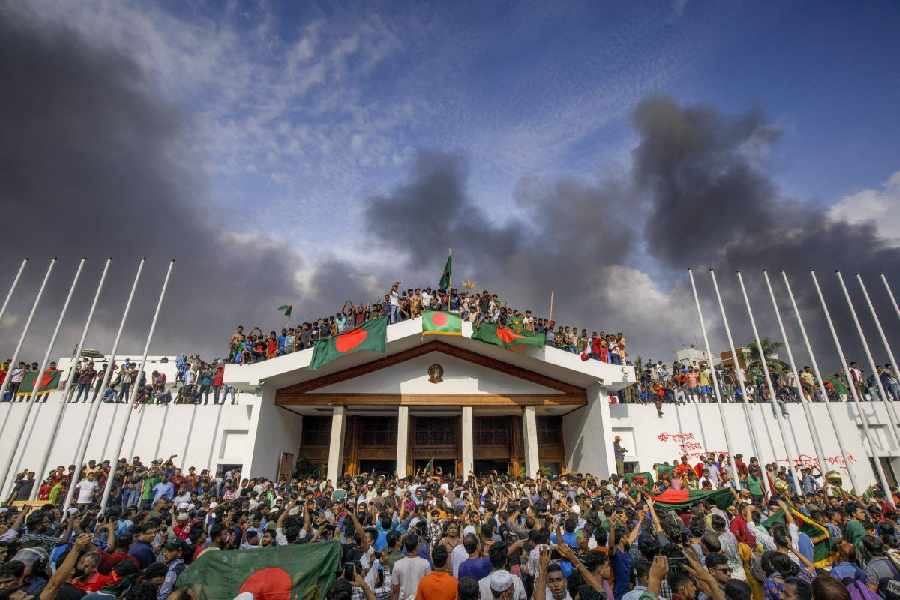The “historic day of August 5″—the sea of humanity in the streets of Dhaka and the series of events that followed the anti-government protests that changed Bangladesh’s destiny—is etched forever in the mind of software developer Tawhidul Alam.
The inhabitant of Dhaka remembered the mayhem that engulfed the city of Bangladesh on that particular day, from the main thoroughfares to the airport, which was “closed for six hours” when the Sheikh Hasina government fell.
“I don’t lean political in any way. I simply went to see the demonstrations as a suffering citizen of Bangladesh. Alam told PTI, “I have never seen such crowds in the streets and marching with ‘victory’ slogans. There is a sea of humanity in the streets of Dhaka.”
5 August saw the peak of anti-government demonstrations, and Prime Minister Hasina resigned and left the nation, despite the fact that demonstrators hailed 5 August as a “day of victory” for the fall of the government.

The troubled 76-year-old leader arrived in India on August 5 and is still there. New Delhi had earlier stated that they wanted to give Hasina time to make her own decisions, despite the fact that her two-week stay in India had sparked a lot of rumours.
The protests in Bangladesh, which were sparked by the return of a quota system for the distribution of civil service positions, have resulted in several hundred deaths and injuries.
The UN Human Rights Office earlier said in a preliminary report that nearly 650 people had died in the recent unrest in Bangladesh between July 16 and August 11. The report recommended a comprehensive, unbiased, and transparent investigation into reports of extrajudicial killings, arbitrary arrests, and detentions.
According to the UNHCR report, thousands of protestors and bystanders were hurt, and hospitals were overflowing with patients as a result of the surge of patients. Those slain included protestors, bystanders, journalists, and many security forces members.
Despite the danger of leaving the house, Alam claimed he went to “witness the protests” as a bystander.
“I went home after walking the lengthy march for a while, even though I knew there was a risk involved. It was a historical moment in the making,” he said.
The software developer, whose employer is in the travel and tourist industry, was in India a few days ago and came back on August 18.
“The Dhaka International Airport is operating more or less normally these days, but on August 5 when it was announced that the airport would be closed for six hours, there was an absolute breakdown. My Canadian-Bangladeshi friend had to return to the city since he was at the airport during the closure and was unable to board the plane,” Alam said. He then rescheduled and arrived in Vancouver a few days ago.
A brother and sister pair from Bangladesh, who wished to remain anonymous, have also returned from India, where their parents received medical care.
Not long after Dhaka airport’s commercial activities had resumed, we boarded an aircraft to Delhi. “I believe we were lucky that both our parents were in India and that we had to visit them,” he remarked, adding that their visa was approved since their parents had a medical emergency.
In addition to Alam and the Dhaka siblings, numerous other Bangladeshi nationals whom PTI met with had similar opinions about what had occurred on August 5.
On August 8, when the Parliament was dissolved in response to a demand made by the Anti-Discrimination Student Movement, an interim administration led by Nobel Laureate Muhammad Yunus was sworn in.
Living close to Shaheed Minar, a national monument honouring the Bengali language movement, Mohd Shahid claims that Shahbagh and this monument site were the epicentres of the most recent anti-government demonstrations. Shahid is a resident of the Dhaka University neighbourhood.
When there was gunfire from the police, I could hear it from my home and see thousands of people walking the streets in defiance of the curfew. He told PTI at Shaheed Minar on Monday night, “I can still hear those bullets when I think about them.
Md Mashrur, a 21-year-old Dhaka University undergraduate economics student in his first year, stated that although he too want to watch the protests, “my parents did not allow me to venture out, owing to safety concerns.”
He expressed his happiness that an interim government has taken over from the previous dictatorship and expressed the hope that new elections will be held as soon as feasible.
